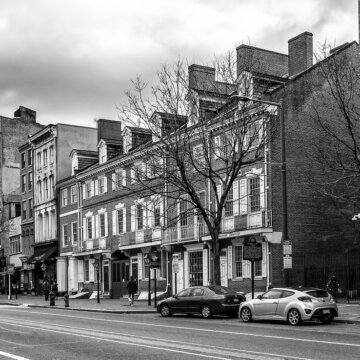- About
- Topics
- Picks
- Audio
- Story
- In-Depth
- Opinion
- News
- Donate
- Signup for our newsletterOur Editors' Best Picks.Send
Read, Debate: Engage.
| topic: | Human Rights |
|---|---|
| located: | USA |
| editor: | Yair Oded |
Last month, the city of Philadelphia agreed to hand over 50 vacant homes to a community trust fund for permanent-low income housing, marking a historic victory for unhoused people and activists. This achievement, secured after many months of protests by unhoused individuals and housing advocacy organisations, should now be used as a blueprint for addressing the swelling housing insecurity crisis across the United States.
For many months, unhoused individuals established protest encampments in key spots across Philadelphia. Their demand? Immediate and adequate solutions for the city’s estimated 5,000 homeless people. Protesters erected the camps in an attempt to both pressure city officials to take action and protect themselves from the hazards of life on the streets.
The Black Lives Matter protests that erupted following the murder of George Floyd emboldened housing activists’ case and highlighted the fact that the housing insecurity crisis is inextricably linked to issues of systemic racism. “Talk about Black Lives Matter: We’re talking about Black disabled people, we’re talking about Black drug users, we’re talking about Black sex workers, and we’re talking about Black women,” Sterling Johnson, a camp organizer and local activist, told The Intercept.
Despite recurring threats by the city to crackdown on the camps, unhoused activists and organisers stood their ground, and finally secured a deal with the city. The agreement, made between the Philadelphia Housing Authority (PHA) - the city agency entrusted with handling public housing - and the Philadelphia Housing Action - a housing advocacy coalition - stipulates that 50 city-owned, vacant houses will be transferred to a community trust fund set up by Philadelphia Housing Action. “The land trust will permanently designate the properties for use as extremely low-income housing ($25,000 and below) and be managed by local control committees,” Philadelphia Housing Action stated.
The agreement also permits the mothers and children who had taken over 15 city owned houses to remain there until the PHA finds them adequate accommodation elsewhere.
But while the deal made between Philadelphia Housing Action and the PHA guarantees housing for all dwellers of the two major protest encampments (Camp James Talib Dean and Camp Teddy), it does not provide a sustainable solution for the rest of the city’s unhoused population. “The whole point was to make sure everybody had a house,” Johnson told The Intercept. “And we didn’t get that. So, it’s alright. But we’re going to continue to fight.”
The criticism levelled against the PHA hinges on the agency’s long-standing practice of amassing properties allotted for low-income housing and paid for by taxpayers’ money and selling them off to developers, thereby exacerbating an already bitter homelesness crisis in the city. This, alas, is not unique to Philadelphia; across the United States, housing authorities and municipalities gobble up properties designated for public housing and convert them into for-profit units.
“This dynamic exists all over the country, where you have both empty housing and houseless people - a completely irrational expression of what American capitalism means,” Keeanga-Yamahtta Taylor, a writer for The New Yorker and author of Pulitzer Prize finalist Race for Profit: How Banks and the Real Estate Industry Undermined Black Homeownership, told Democracy Now! “You have public housing authorities [...] which is [...] sitting on properties, that they should be distributing to people in need of housing [...] waiting for the right price point to flip those properties for profit. And that is unconscionable for public housing authorities to be engaged in that kind of predatory, gentrifying behavior.”
But Taylor, as do many housing activists and unhoused people in Philadelphia and beyond, believes that last month’s victory constitutes a substantial step in the right direction, and claims it should be used as a model for housing activists around the country, particularly as the COVID-19 pandemic renders tens of millions of Americans vulnerable to evictions.
“[O]ccupy the space, occupy the properties, and put pressure, political pressure, on public housing authorities to do their job and house people who are unhoused. It is not that complicated,” Taylor said. “Now is the time, I think, to move on this, because the emergency of housing insecurity is at its most acute point, but also there’s a greater connection being made between housing as healthcare, housing as a right, that has been demonstrated by the CDC’s own moratorium against evictions, which really demonstrate that housing is an issue of healthcare as well as an issue of shelter.”
Image by Bruce Emmerling
